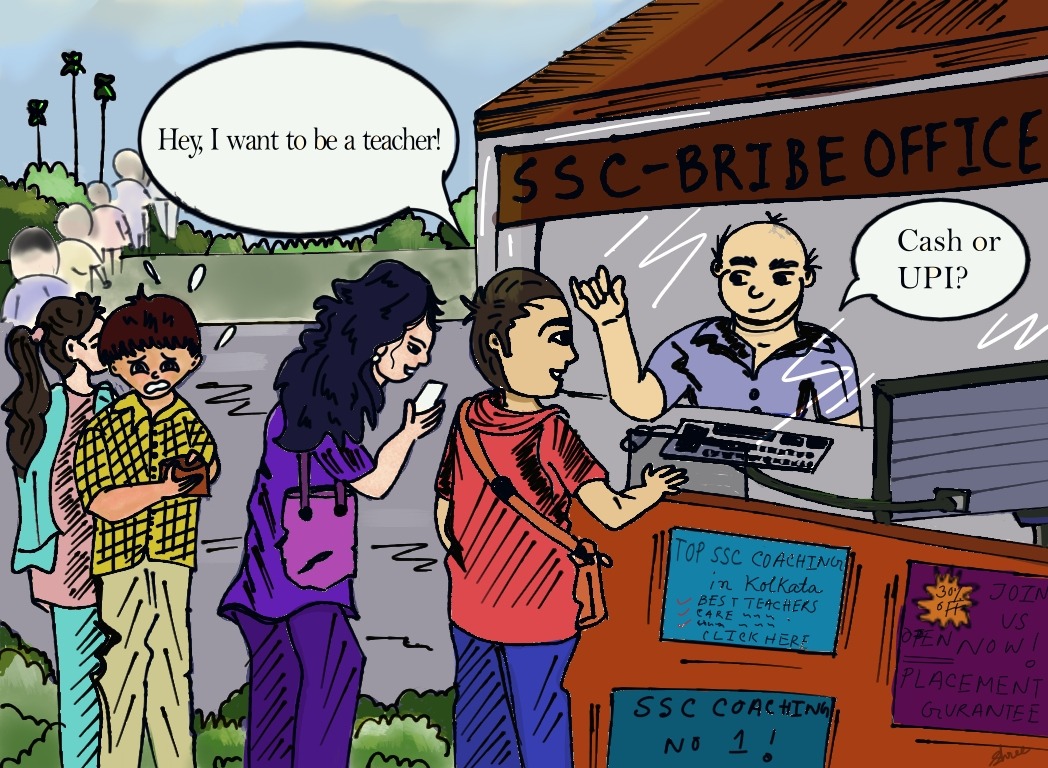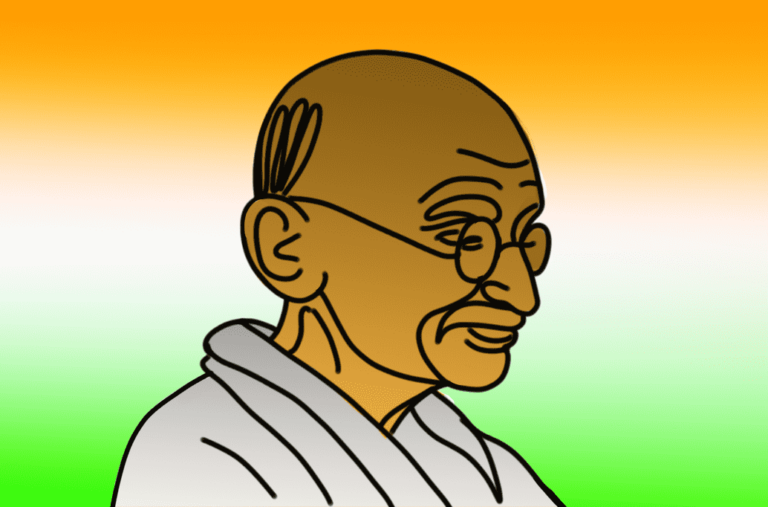The pedagogy of corruption: India’s tryst with ‘purchased’ privilege
Views expressed are personal
It takes an impressive level of bureaucratic choreography to hire over 25,000 teachers through a recruitment process so riddled with fraud that even the Supreme Court could only throw up its hands and cancel the entire show (LiveLaw, 2025). Yet, in West Bengal, that performance unfolded with such seamless dishonesty that the judiciary had little choice but to bring down the curtain. While some may see this as a routine judicial intervention, others recognize it for what it truly is: a grim parable about a nation where e-governance collides with envelope-governance—and privilege masquerades as procedure.
This verdict is not just about annulled jobs. It’s about the ghost of an India that refuses to retire—an India where the path to stability, respect, and prosperity still too often runs through the backdoor. It’s about an educational void that isn’t merely infrastructural or academic—but deeply moral, philosophical, and, dare one say, civilizational. The crisis reveals how easily education, the one thing meant to free us, can be re-engineered to trap us further.
A rehearsal
India’s brush with corruption is not new. The British may have institutionalized bureaucracy, but we made a sport of subverting it (Guha, 2007). From the “he who pays, rules” ethos of princely states to the more recent spectacles like the Vyapam scam—where even death became a footnote—India has seldom failed to invent new ways of gaming its own systems.
The WBSSC recruitment scam echoes these precedents with uncanny familiarity. That a state-run mechanism designed to empower the next generation became a transactional bazaar for jobs is a brutal indictment of our historical amnesia. The ghosts of maladministration past are alive and well—and they’re invigilating our exams.
The sacred cow of Sarkari Jobs
To understand the gravity of the problem, one must understand the fetishization of the sarkari naukri. In Indian households, it is less of a career and more of a religious attainment. The government job is seen as a karmic reward—complete with lifetime security, modest labor, and generous pension (Pinto, 2022). The competition to secure it, naturally, has produced two kinds of aspirants: the hardworking, and the well-connected.
And while the hardworking appear dutifully at coaching centers at 6 a.m., the well-connected merely appear at someone’s doorstep with an envelope. The unspoken social contract—where money lubricates the machinery of access—is no longer seen as deviant. It is often considered smart, strategic, even aspirational. In a country where bribes are seen as “facilitation fees” and exam leaks trend on Telegram, corruption isn’t always scandalous. Sometimes, it’s just business as usual.
The magnitude of the issue is not limited to transactional dishonesty. It is cultural, familial, and deeply internalized. Parents proudly discuss “contacts” over chai, newspapers nonchalantly advertise coaching centers run by political veterans, and students casually weigh merit against monetary muscle. In such a climate, the line between strategic advantage and ethical compromise becomes disturbingly blurred.
When power and pedagogy collude
It is one thing when politics corrupts contracts. It’s quite another when it corrupts classrooms. The teacher, in Indian tradition, is more than an employee. They are the custodian of values, the medium through which civilizations are imagined. So, when political patronage infiltrates their appointment, we do not merely risk a few bad hires. We risk an entire generation being shaped by those who never deserved to stand at the lectern (Sen, 2011).
Such appointments create a chilling paradox: a dishonest system training children to be honest citizens. The irony, of course, would be delicious—if it weren’t so devastating. In such classrooms, what gets taught is not merely outdated syllabi but the silent lesson of impunity. Students begin to internalize a truth sharper than any exam question: honesty might be noble, but it rarely pays.
Of satire and the syllabus
If R.K. Laxman’s Common Man was alive today, he’d probably queue up at an SSC office with his resume, wondering whether the bribe goes in cash or UPI. After all, even corruption has digitized. “Efficiency matters,” he might mutter, tiptoeing past a retired politician who now runs a coaching center promising ‘guaranteed selections.’
Satire now resides in village gossip as much as in editorial cartoons. A man from rural Bengal, upon hearing of his son-in-law’s job cancellation, lamented, “He had a government job, so we didn’t even bother checking his caste.” The irony is ruthless: caste, that historical determinant of privilege and prejudice, rendered irrelevant by the assumed permanence of government employment. It was a statement soaked in social commentary—on the collision of desperation, pragmatism, and prejudice. A casteist society willing to override its own orthodoxy in favor of financial stability—until, of course, the job is taken away.
Such ironic vignettes lay bare the contradictions at the heart of our social fabric. They highlight not just the collapse of systems but the erosion of shared values. In a society where even prejudice can be temporarily paused for the right paycheck, one wonders what else is negotiable.
Curricular corrections: Between the lines
If systems continue to fall short, perhaps it is time to look elsewhere. In our syllabus, for instance—not in the chapters, but in the quiet spaces between them—there lies an opportunity. What if students were invited to explore real-world case studies alongside textbook civics? Not merely through the lens of governance theory, but through stories—of scams, whistleblowers, and consequences? What if every ethics class began not with a quote, but with a question: “What would you do if your cousin got a government job through bribes?”
This is the realm of the hidden curriculum, where values are not taught but inferred (Jackson, 1968). Where every story carries the silent moral: integrity is a liability only until it becomes the last thing left standing. Imagine a pedagogy that doesn’t just extol Gandhian honesty in moral science lessons but juxtaposes it against headlines from today’s newspapers. Imagine civics exams where one answers not only how democracy functions, but also what happens when it malfunctions. Where students learn that when laws fail, consequences don’t.
In nudging curricula to dwell longer on dilemmas, uncertainties, and moral ambiguities, we aren’t prescribing reforms—we’re quietly engineering them. By turning our classrooms into crucibles of ethical inquiry, we do more than produce exam-takers; we nurture decision-makers. And perhaps, by engaging students in these gray zones early on, we’ll inoculate them against the black money later.
The price of a shortcut
The tragedy of the Bengal teacher recruitment scam isn’t merely the jobs lost. It is the integrity lost in the process. It’s not just that rules were broken—it is that they were expected to be broken. That’s the real scandal. That’s the real syllabus we never wrote.
If this country is to move from survival to self-respect, it must begin in its classrooms. And not with smart boards or NEP slogans—but with the oldest lesson in the book: actions have consequences. We must stop teaching our children to outsmart the system and start teaching them to build one that no one needs to outsmart.
Until then, let the Supreme Court cancel what it must. The rest of us should worry about what’s still being passed—in the syllabus, and under the table.
References
- Pinto, R. (2022, May 8). Behind India’s government jobs frenzy and the generation of young people longing for a future. Le Monde.fr. https://www.lemonde.fr/en/economy/article/2022/05/08/behind-india-s-government-jobs-frenzy-and-the-generation-of-young-people-longing-for-a-future_5982787_19.html
- LiveLaw. (2025, April 2). Selection process tainted: Supreme Court upholds quashing of 25k staff appointments by West Bengal SSC in 2016. https://www.livelaw.in/top-stories/selection-process-tainted-supreme-court-upholds-quashing-of-25k-staff-appointments-by-west-bengal-ssc-in-2016-288288
- Sen, A. (2011, July 5). Amartya Sen criticises neglect of elementary education. The Hindu. https://www.thehindu.com/news/national/amartya-sen-criticises-neglect-of-elementary-education/article2159413.ece
- BBC News. (2015, July 7). Vyapam: India’s deadly medical school exam scandal. https://www.bbc.com/news/world-asia-india-33421572
- Guha, R. (2007). India after Gandhi: The history of the world’s largest democracy. HarperCollins
- Jackson, P. W. (1968). Life in classrooms. Holt, Rinehart and Winston.








